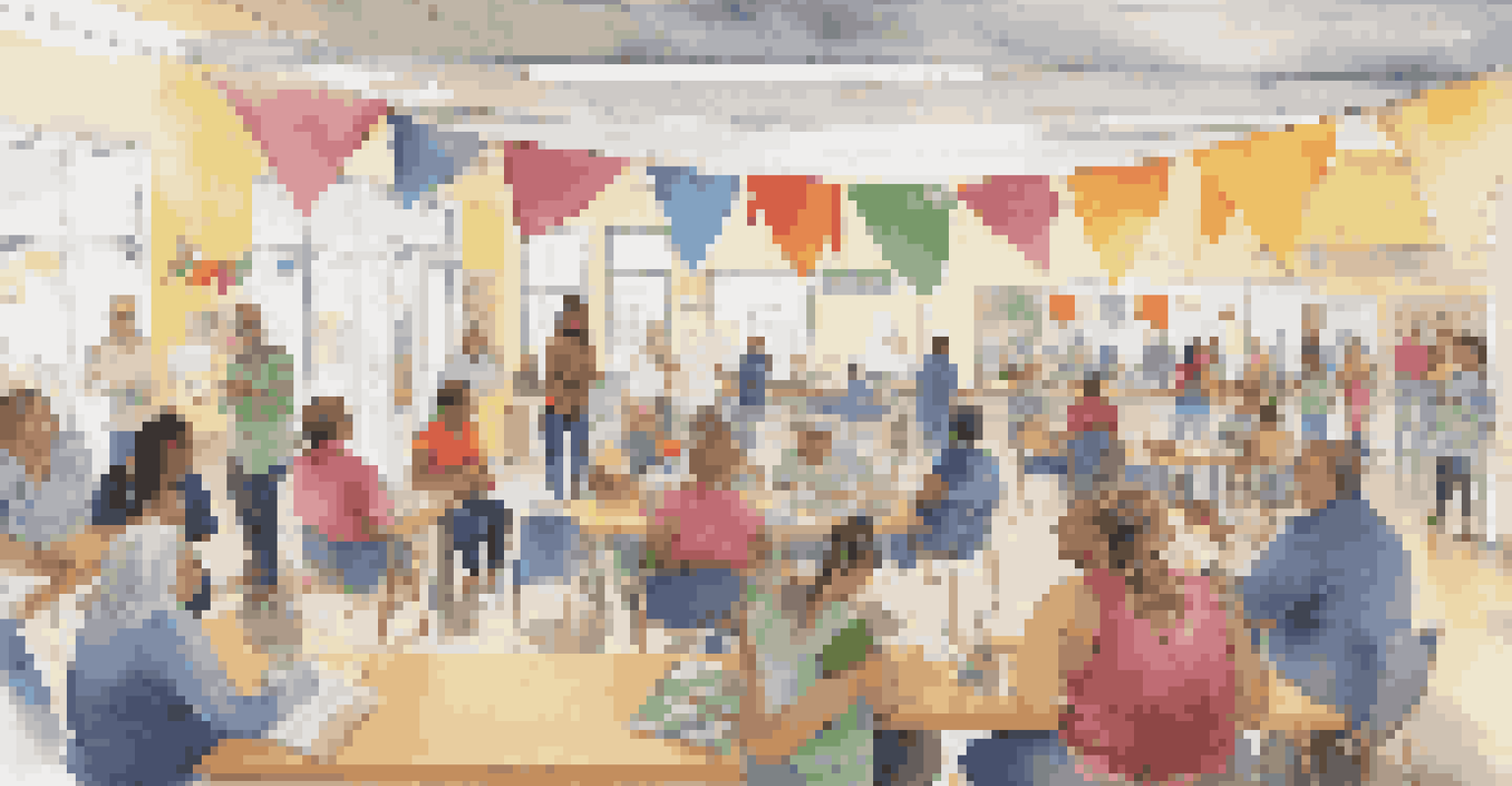Leveraging Community Resources for Self-Directed Learning

Understanding Self-Directed Learning and Its Importance
Self-directed learning is an approach where individuals take the initiative in their educational journey. It empowers learners to identify their needs, set goals, and pursue knowledge independently. This method is especially relevant in today's fast-paced world, where information is abundant and readily accessible.
The beautiful thing about learning is that no one can take it away from you.
One key aspect of self-directed learning is that it fosters a sense of ownership and responsibility. Learners are not just passive recipients of information; instead, they actively seek out resources and experiences that align with their interests. This can lead to deeper understanding and retention of knowledge.
Moreover, self-directed learning encourages lifelong learning habits. As individuals become accustomed to finding and utilizing resources on their own, they develop skills that will serve them well throughout their lives, enabling them to adapt in various personal and professional contexts.
Identifying Community Resources for Learning
Communities are treasure troves of resources that can significantly enhance self-directed learning. Libraries, community centers, and local organizations often offer free or low-cost workshops, classes, and materials. These resources can provide valuable hands-on learning experiences and connect individuals with like-minded peers.

Local experts and mentors are another vital asset within the community. Engaging with these individuals can provide insights and guidance that one might not find in traditional learning environments. Often, these mentors are more than willing to share their knowledge and experiences with eager learners.
Additionally, online community platforms, such as forums and social media groups, have made it easier to tap into these resources. In today's digital age, finding communities that share your interests or goals is just a click away, making it simpler than ever to access diverse learning opportunities.
Building Connections Through Networking
Networking is a critical element in leveraging community resources for learning. By connecting with others in your community, you can discover new opportunities, share knowledge, and gain support. Building relationships with fellow learners can create a sense of accountability and motivation to pursue your learning goals.
Education is the passport to the future, for tomorrow belongs to those who prepare for it today.
Attending local events, workshops, or meetups can be a great way to start networking. These gatherings often provide an informal environment where you can engage with others, ask questions, and exchange ideas. The more you immerse yourself in these settings, the more resources and connections you will uncover.
Moreover, networking can lead to collaborative learning experiences. By forming study groups or project teams, you can benefit from the diverse perspectives and skills of others, enhancing the overall learning experience for everyone involved.
Utilizing Local Libraries as Learning Hubs
Local libraries are often underutilized resources for self-directed learners. Beyond just lending books, many libraries offer workshops, lectures, and access to various learning materials, including online courses and databases. These resources can significantly broaden your knowledge base at little to no cost.
Libraries also provide a quiet space conducive to learning, allowing you to focus and engage deeply with the material. Many libraries have study rooms or tech centers equipped with computers and other resources that can aid your learning journey.
Furthermore, librarians can be invaluable allies in your quest for knowledge. They are skilled at navigating information sources and can assist you in finding specific materials or resources that align with your learning objectives.
Exploring Online Learning Communities
The rise of the internet has led to a proliferation of online learning communities. Websites, forums, and social media platforms offer a wealth of resources, discussions, and courses that cater to virtually any interest. Engaging in these platforms can connect you to a global network of learners and experts.
Online communities often provide opportunities for interactive learning, such as webinars, live discussions, and collaborative projects. This interactivity can enhance your understanding of the subject matter and provide immediate feedback from peers and instructors.
Additionally, many online platforms allow you to join groups or forums specifically related to your interests, enabling you to share resources, ask questions, and learn from others' experiences. This creates a sense of belonging and support that can be crucial in a self-directed learning journey.
Volunteering as a Learning Opportunity
Volunteering is not just a way to give back to the community; it’s also a fantastic avenue for self-directed learning. By getting involved in local organizations or initiatives, you can gain hands-on experience and develop new skills while contributing to a cause you care about.
Many organizations offer training and workshops for volunteers, which can be valuable for personal and professional development. These experiences often provide practical applications of theoretical knowledge, making learning more tangible and relevant.
Moreover, volunteering allows you to network with individuals who share your interests and values. These connections can lead to mentorship opportunities, collaborations, and even job prospects, further enriching your learning journey.
Creating a Personalized Learning Plan
To effectively leverage community resources, it's essential to create a personalized learning plan. This involves identifying your goals, the skills you wish to develop, and the resources available in your community that can help you achieve these objectives. A well-structured plan provides direction and keeps you focused on your learning journey.
Your learning plan should also incorporate flexibility. As you explore community resources, you may encounter new interests or opportunities that could alter your initial goals. Being adaptable allows you to embrace these changes and enrich your learning experience.

Finally, regularly reviewing and updating your learning plan is crucial. This reflection helps you assess your progress, identify areas for improvement, and celebrate your achievements, ensuring that your self-directed learning remains a fulfilling and rewarding endeavor.